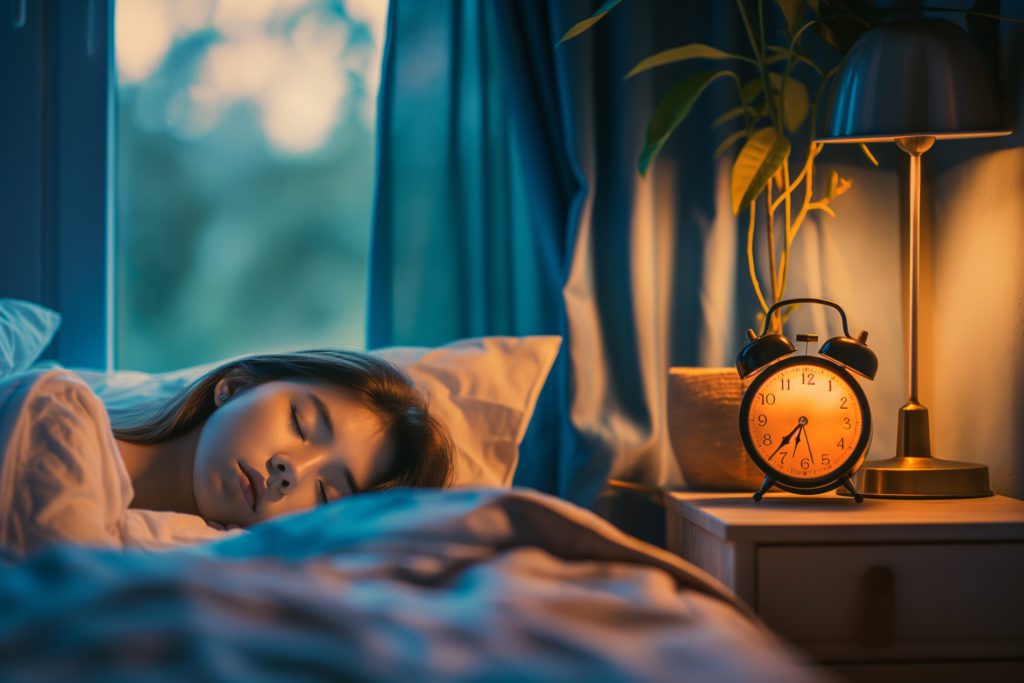
From Snooze Button to Morning Person: Tips for Changing Your Sleep Habits
Do you normally hit the snooze button multiple times? Here’s how to change your sleep habits to go from a night owl to a morning person.

Are you someone who constantly hits the snooze button? Do you want to learn how to be a morning person? Maybe you’ve seen the numerous TikToks of early birds posting videos of themselves enjoying nature or exercising at the crack of dawn. Or, the many celebrities who boast about waking up at 5 a.m. Now, you’ve decided that you’d like to take part in the early morning lifestyle.
The good news is that it is possible to become a morning person. A study published in Sleep Medicine found that night owls were able to become morning larks by simply tweaking their lifestyle habits. This study also demonstrated that waking up earlier led to serious mental health gains.
What Determines If You Are a Morning Person?
Everyone has a chronotype, which is a natural tendency to wake up at a certain time. Some people are “larks” meaning they wake up early in the morning. Others are “night owls” who like to go to bed late and sleep in. Your chronotype is largely determined by genetics. However, you can train yourself to wake up earlier or later, as your chronotype is also influenced by your environment.
Ready to Wake Up Earlier? Here’s How To Change Your Sleep Habits
With a few simple changes to your sleep and daily schedule, you can become a morning person.
Don’t Skimp on Sleep
Adults need between seven to nine hours of sleep a night to feel restored. Don’t forgo sleep to wake up earlier. This will only cause you to feel exhausted during the day and can lead to health issues like depression.
What determines whether you need seven or nine hours a night? This depends on lifestyle factors like the amount of exercise you get each day. Athletes may need more sleep than sedentary folks. If you take naps during the day, you may need less sleep at night.
Stick to the Same Sleep Schedule Every Day
If you decide to join the 5 a.m. club, you’ll need to also wake up at 5 a.m. on Saturdays and Sundays! If you don’t keep the same sleep schedule every day of the week, it can negatively affect your circadian rhythm. Consistency is the key when it comes to changing your sleep patterns. So, if you don’t feel that you can do 5 a.m. wakeups on the weekend too, perhaps aim for a wakeup time that is less extreme.
Adjust Your Sleep Schedule Slowly
Becoming a morning person will not happen overnight. You can’t significantly change your sleep schedule quickly without feeling like crap the next day. Tweak your sleep schedule slightly each night until you get to your ideal wake-up time. It’s best to shift it in 15-30 minute increments. It may take some time, but this strategy will help your body (and circadian rhythm) adjust to the new schedule. It will help prevent you from feeling tired during the day.
Don’t Hit The Snooze Button
Do you hit the snooze button two, three, or maybe even four times a morning? If you want to wake up earlier, resist the temptation to hit the snooze button. Continually hitting the snooze button can cause sleep inertia — making it that much harder to wake up. So, turn off the option to snooze your alarm.
Create a Structured Bedtime Routine
Have a structured bedtime routine that you follow every night starting about 60 minutes before your bedtime. Here are some activities you can incorporate into your routine. These are just ideas. Do whatever works best for you.
- Drink a cup of herbal tea: A cup of non-caffeinated tea containing chamomile or lavender can help you relax and possibly sleep better.
- Read a relaxing book: A calming book can help you detach from the day’s stresses and focus on the storyline. This can help you relax and fall asleep.
- Give yourself a massage: A neck or face massager works great for this.
- Practice gratitude journaling: Practicing gratitude is a great way to de-stress. To do this, you simply write down things that you are grateful for. It can be something small like a comfortable pillow.
- Listen to an adult bedtime story: Adult bedtime stories are relaxing and help banish worrying thoughts that keep you from sleep.
Get Plenty of Natural Light Early
Exposure to bright light early in the morning can help you wake up. Light suppresses melatonin, the hormone that regulates your sleep cycle. When melatonin is suppressed, it tells your body that it’s time to wake up.
Avoid using blackout curtains in your room. These will keep the morning sun out. Instead, try to keep your blinds open so the sun shines in your room in the morning. As soon as you wake up, go outside for a short walk or sit outside on the porch while you have your morning cup of coffee. Experts recommend at least 30 minutes of sun exposure within two hours of waking up.
Have a Morning Routine That You Look Forward To
Having something to look forward to when you wake up will give you a good reason to get out of bed earlier. You won’t be dreading waking up so early. You can include any number of things in your morning routine:
- A cup of coffee on the porch
- A 20-minute early morning walk
- A breathwork session
- Reading for 20 minutes
- Cooking a nourishing breakfast
Resist the Urge to Reach for Caffeine
You feel sluggish and tired in the afternoon when you first change your sleep schedule. So, you get in line at Starbucks for a little pick-me-up — a shaken espresso. It will help wake you up after all, right? While it might give you a temporary boost in energy, drinking caffeine more than eight hours before bed can mess up your sleep. If you feel sluggish, try going for a walk outdoors instead.
Final Thoughts on Changing Your Sleep Habits
Ultimately, whether or not you achieve your goal of becoming a morning person, the most important thing in terms of wellness is to consistently get enough good-quality sleep.
FAQ
Is it healthy to wake up before sunrise?
Yes, waking up before sunrise can be healthy if you get enough sleep and align it with your natural rhythm. Early wake-ups allow for quiet, productive mornings and exposure to natural morning light, which helps regulate your circadian rhythm. However, prioritizing sleep quality and duration is essential.
How does one's chronotype affect the ability to become a morning person?
Chronotypes are natural predispositions toward certain sleep times, influenced by genetics. While some individuals are naturally night owls, gradual adjustments in sleep habits and exposure to morning light can help shift one's circadian rhythm to support earlier wake times.
Does exposure to natural light in the morning help with waking up earlier?
Yes, natural light helps regulate your circadian rhythm by signaling to your body that it’s time to wake up. Spending time outside in the morning or using a light therapy lamp can improve alertness and make it easier to wake up early.
Is it beneficial to adjust my social activities to become a morning person?
Yes, aligning social activities with your desired sleep schedule can reinforce your new routine. Engaging in evening activities that end earlier and planning morning meetups can support your transition to becoming a morning person.
Can taking melatonin supplements help me become a morning person?
Melatonin supplements can help shift your sleep schedule by signaling your body to sleep earlier. However, they should be used with caution and taken at the right time (typically 1-2 hours before bedtime). Consulting a doctor before use is recommended.
How long does it take to successfully become a morning person?
It varies by individual, but most people can shift their sleep schedule within 2-4 weeks with consistent effort. Gradually adjusting bedtime, maintaining a consistent routine, and reinforcing wake-up cues like light exposure and movement can speed up the transition.
How can I stay motivated while transitioning into a morning person?
Setting goals, creating a morning routine you enjoy, and rewarding yourself for waking up early can help maintain motivation. Tracking progress and focusing on the benefits—such as increased productivity and better well-being—can reinforce the habit.

Written by
Emily Mendez
Emily Mendez is a former therapist and mental health author. She is one of the leading voices in mental health. Emily's writing has appeared in eCounseling, SonderMind, and more. Emily is frequently interviewed by Healthline, Fatherly, INSIDER, Family Circle, and other national media for her advice and expert opinion on the latest mental health topics.
Download Pillow
Get help
Press & News
Legal
Connect
X (Twitter)
Company
Copyright © Neybox Digital Ltd.



